The Wints
Richard Prest of Kernow Beat describes one of Cornwall's
most famous music venues: Penzance's Winter Gardens.
d
John Adams was the
driving force behind the success of what would become one of
Cornwall's finest music venues in the 60's & 70's. John was
born and raised in the North. His parents ran a snack bar
where he had the responsibility of obtaining the 78's for
the juke box with records by the likes of Elvis, Frankie
Laine and Guy Mitchell. While at school he also demonstrated
a flair for promotion, running the Modern Music Society.
In Blackpool John learnt his trade,
undertaking a three year Hotel Management course and
organising dances, parties, etc. On completion of his course
in 1960 he worked the summer in Bude where John was bitten
by the surfing bug. After an 18 month stint working for the
Hotel Excelsior in Cologne he returned to his native
Yorkshire.
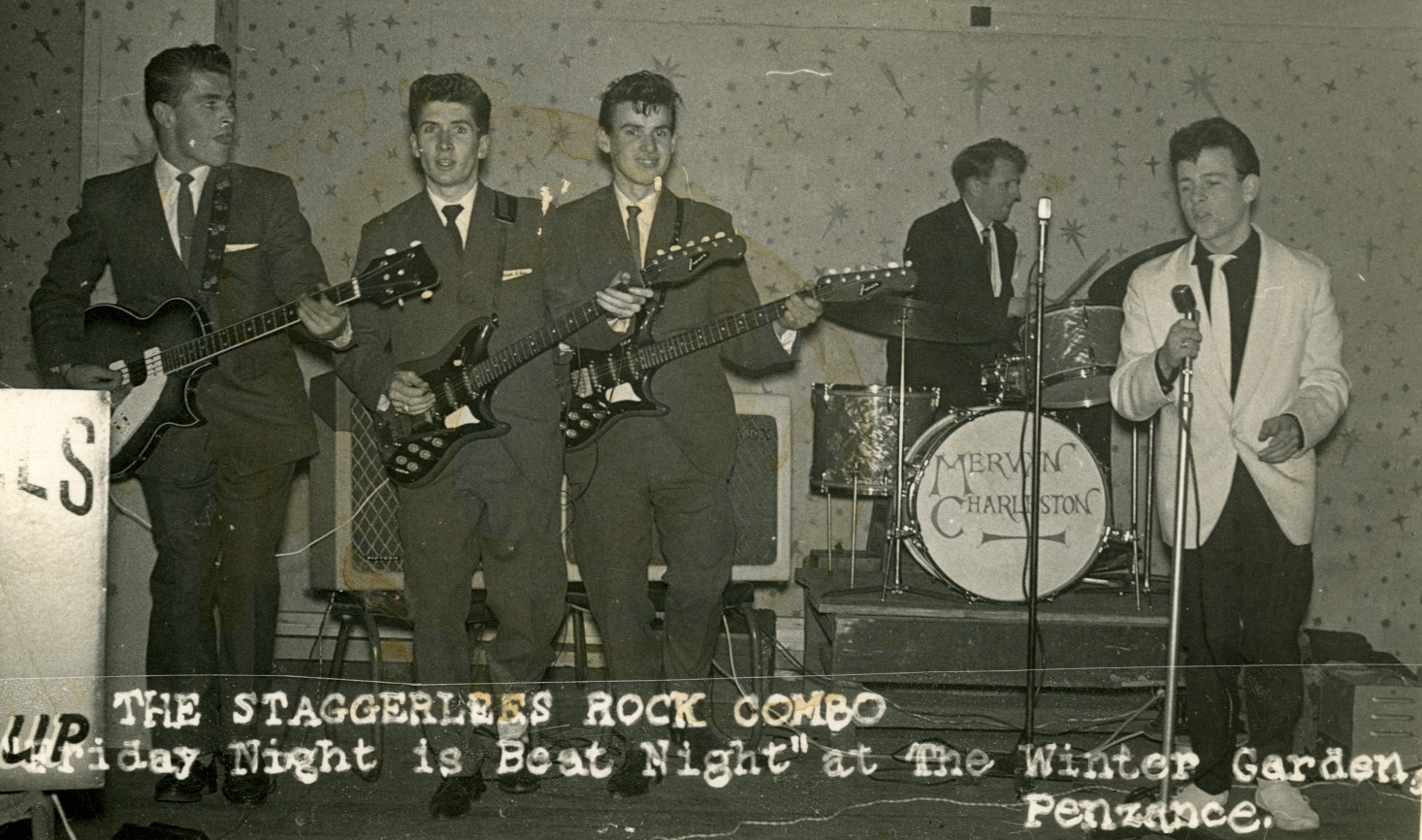
Redruth's Staggerlees
In the early 60's an acquaintance of the
family was running into difficulty with his bingo hall in
Scarborough. Worried the business was going under he looked
around for other investments and came across a hall on the
Penzance sea front that was up for sale.
The Winter Gardens was originally owned by
Gordon Fenton, a local businessman who also ran many other
successful ventures including Cornish Mead and Cornish Fish
Fertiliser. At the time the venue was managed by Russell
Pengelly. The Winter Gardens were putting on dance bands,
such as the Blue Rhythmics, Trevor Lapham and the Savoy
Band, and during intermissions Russell would entertain the
crowds on a piano.
The acquaintance of the Adams family
bought the Winter Gardens from Gordon Fenton in 1961 as a
safeguard in case the bingo business went under. The
business in Scarborough didnít collapse and therefore he no
longer wanted to keep the Winter Gardens, and in 1962
offered it to John and his family. John jumped at the chance
at being able to run dances and functions, while also being
located in Cornwall with the surf on his doorstep.
The venue very nearly never was, when the
great Ash Wednesday storms battered the Penzance sea front.
The building survived but was filled with sand, sea, debris
and dead fish.
The early years of the Winter Gardens
were quite a civil affair with floral baskets and a stage,
and it was open one night a week for dancing to the likes of
Ivy Benson, Ken Macintosh, Ted Heath and other dance bands.
The venue had a very good sprung wooden floor so made an
excellent venue for dancing.
With the increase in popularity John
started to introduce different evenings to cater for
different crowds, in particular the thriving teenage market,
extending the one day a week opening. Friday night would become Beat Night with local bands like The Buccaneers, Layabouts and The Staggerlees taking to the stage. Later on,
each night would hold a different event. Folk concerts took
place on Tuesdays with performers like Ralph McTell and Mike
Chapman. Wednesdays would feature local bands with free
admission. Thursday would be a concert night (with rock
bands). Friday night was either closed for private functions
or a 'pop' night, and Saturday would be the ever popular disco,
sometimes featuring bands. Ballroom dancing would also
continue with the Silver Slipper Club taking up two nights a
week.
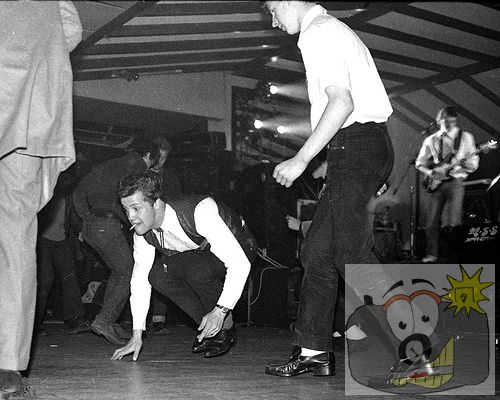
Dancing at the Wints
As the beat boom took hold more bands from
out of Cornwall would visit and there was an ever expanding
crowd of local teens forming bands and looking for gigs to
play. John would always try and match a support band with
the visiting band. One example was local band The Blue Caps
(always drew a big crowd) who were matched against visiting
band The Red Caps from Birmingham. In the post-Beatles era
John would put out flyers and posters around town promoting
the week's entertainment and any mention of the "Mersey
Sound" would be guaranteed to bring in a big crowd.
The quantity and quality of bands
continued to increase as the 60's moved at a rapidly
increasing pace. The venue became very popular and now
started to form part of the bands' touring circuit. Many
bands would start their journey in London, coming down as
far as Penzance and then gig their way back up to London.
John would visit London's famous Marquee Club on occasions
to scout for the latest talent to book.
This, of course, was during the days when
bands had to make a long slog on the road to earn their
stripes and build up their fan-base. They could be playing in
Birmingham one day, Penzance the next and then up to
Newcastle the next day. Managers were keen to make as much
cash as possible, with little thought for the poor bands who
spent days and weeks on the road in clapped out old Transit
vans.
One band popular visiting band in the
early days was Robbie Hood & The Merry Men. They went down a
storm, playing excellent covers of all the top 20 hits. When
John tried to book them again he found out through the agent
that they had changed their name to The Fortunes, and were
now riding high in the charts with "You've got your
troubles". In its first full season the venue had put on
Johnny Kidd & The Pirates, Wayne Fontana and The Mindbenders
and The Fortunes. The punters had a chance to see lot of
bands such as Robbie Hood before they became famous.
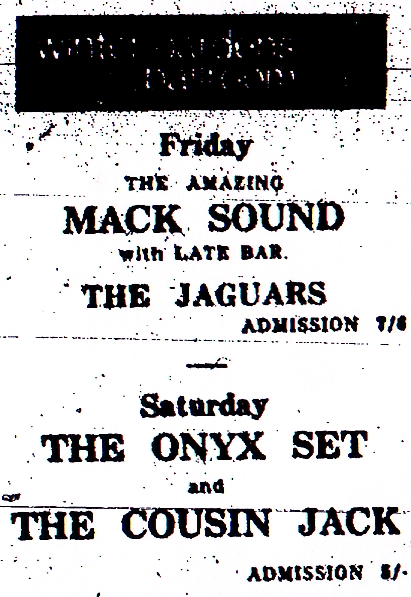
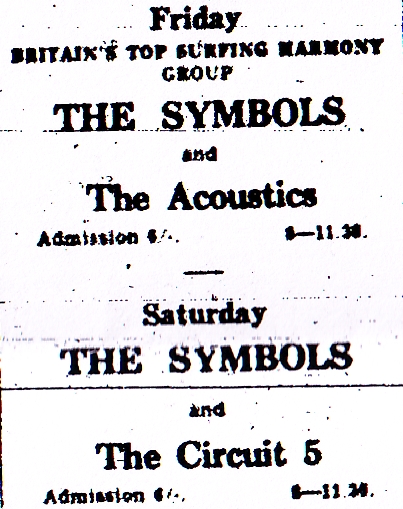
Although there were no Beatles, Stones or
Hendrix, John otherwise managed to book a who's-who of mid-60's UK
music. Some of the bigger bands like The Yardbirds (and
later Slade) had to be moved to the cavernous Flamingo
Ballroom in Pool to accommodate the crowds.
In the 60's John formed an "Association of
Ballrooms" with Harry Costa (Blue Lagoon), Peter Brown (BCD
Entertainments), Joy Hone (Flamingo Ballroom), Sam and
Irving Kammin (400 Ballroom, Torquay) and later Lionel Digby
(LMD Entertainment) and a representative from Cardiff. They
would look at schedules of bands and book them collectively.
John would try and book a band somewhere in the middle of
the tour so he could find out how they went down, ensuring
that any problems were ironed out before the gig.
Many venues thrived under the beat boom
but failed to move with the rapidly changing times. The
Winter Gardens on the other hand had no problem keeping
current and bringing in the latest exciting hip bands, as
well as pulling back the more established performers.
In 1968 John was in London and visited
Londonís legendary Roundhouse, where he witnessed U.S bands
The Doors and Jefferson Airplane, who were undertaking their
first European performances. He noticed that those in
attendance were not up dancing, but the hip crowd were sat
on the floor listening to the music. He went back to the
Winter Gardens and started putting on progressive nights,
the first of which were Jethro Tull and Ten Years After.
John supplied foam cushions for the crown to sit on.
At the start of the 70's John tried
(somewhat unsuccessfully) to rebrand the venue as The Garden
and continued to draw in the popular progressive bands, such
as Genesis and Yes, while also bringing in big hitters like
Status Quo, Fleetwood Mac and Fairport Convention.

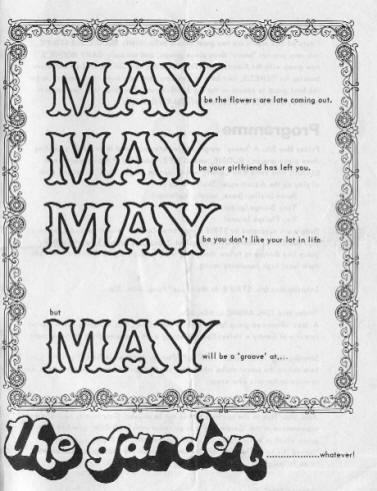
All of The Winter
Gardens promotional material was designed by Mike Deakin
Caravan were always a popular draw locally
and visited the venue on several occasions. On one occasion
John was offered a support band for the sum of £25. As he
was told the drummer came from 'down your way' he decided to
take a chance. The support band were of course Queen and six
months later they were well on their way to becoming a
household name. Queen would return the favour in 1974 by
playing at the Gardens when they were topping the charts.
John always treated the bands well, they
had after all travelled a long way to get there. Coupled
with an excellent reception from the fans, bands felt
well looked after and had plenty of respect for John and his
venue. Many who played in the early days of their careers
would return at a later date as a thank you when they could
be playing much large venues.
On one occasion blues legends Sonny Terry
and Brown McGhee gave a performance. The duo were enjoying
something of a revival at the time and played Penzance as
part of a tour. Reportedly a magical concert, on their
return to the US John received a telegram thanking him for
his hospitality and saying it was the best gig on the tour.
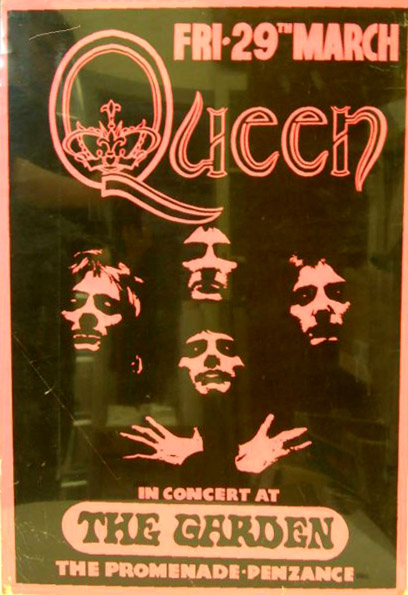
John can only recall one band that didn't play: Steve Harley and Cockney Rebel visiting the Winter
Gardens in 1973. Despite lugging all their equipment all the
way down to the depths of Cornwall they refused to play as
the stage was too small! Be Bop Deluxe were supporting and
went on as the only act, playing for over 2 hours and going
down a storm.
Throughout the time of the venue there
were others who were less than happy about the venue's
popularity. The neighbouring hotels were always complaining
about the noise and 'rabble' the venue brought. The Winter
Gardens had a license to play music until 11:30 and bands
had to finish on time. This often caused problems when
bands hadn't realise how long it took to get to Cornwall and
turned up late. There were occasions when the plug literally
had to be pulled.
In 1969 John assisted his brother, Peter,
in a similar venture in Scarborough, where the pair set up a
club called The Penthouse. Peter had the advantage of a 2am
license, while John was still stuck with the 11am curfew.
The pair became well known and respected amongst the rock
fraternity for being sympathetic promoters with great
audiences. They became so well respected that promoters
would ensure that both venues were included in their bands
touring schedules.
During the late 70's punk began to take
hold and many of the regulars began to drift away. During
this era the venue did put on gigs from the like of The
Stranglers, Talking Heads and The Ramones. It would also
play host to Elvis Costello, performing his debut with the
Attractions.
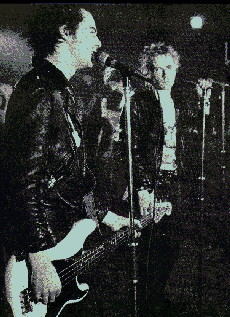
Sex Pistols live at The
Winter Gardens
John also secured a rare appearance from
the Sex Pistols. Having been banned from nearly every venue
in the UK they ventured to the South West billing themselves
as S.P.O.T.S (Sex Pistols on Tour Secretly). They had played
the previous night in Plymouth (promoted as The Hamsters)
and found themselves the following day in Penzance. John
could have billed them as SPOTS, but chose to only include a
question mark in the poster, billing the band as "A Mystery
Band of International Repute". Rumours flew around the town
that it could be a warm up slot by a new super-group, or
even the Rolling Stones. John refused to divulge who was
playing, telling the locals to pay your money and take you
chance. The gig of course passed into legend, with many
people claiming that 'they were there'!
With less interest from the old regulars
and the ongoing hassles from the neighbouring
establishments, in 1979 John decided it was time to move on.
The lease was passed on to Pete Brown of BCD Entertainments.
Pete was the biggest agent in the county and had most of the
big local bands on his books. He ran the venue for a year,
before it was taken on my Mick Hanley. Mick had previously
run another popular Cornish venue, The Penmare Hotel in
Hayle. As was in keeping with the times, Mick and his
manager Henry Quick brought in a roller disco.
In 1985/86 John had big plans for the
venue. He invested a great deal of time and money in
producing plans to have the building pulled down and
re-built, sound proofing it in the same way the large
multiplex cinemas were doing at the time. He also had plans
to incorporate a conference centre, of which none were
available in Cornwall at the time. The local council
received considerable pressure from the neighbouring hotel
and the plans were refused.
Fed up and disillusioned with the venue
John sold the building in 1987 to a builder called Kevin
Boyns (who he had previously banned when running the place!)
and it would become a nightclub known as Demelza's.
Unfortunately Boyns ran foul of the authorities and lost his
music and dance licence. This was a rather sad end to a once
proud venue. It would eventually be purchased by the owner
of the Beachfield Hotel (who had regularly objected to the
disturbances next door).
The site itself is now broken up into
various different parts. A section forms part of a Thai
Restaurant, while the remainder of the building includes
shops and flats. The ceiling of the dressing room was
scrawled on by many a band member over the years, we can
only assume that this part of history has long since
disappeared.....
After many years running one of the UKís
most successful music venues John now runs Three S Films, a
successful film and television production company.

The Winter Gardens
building in 2009
There is lots more on
Richard's excellent site:
http://www.kernowbeat.co.uk